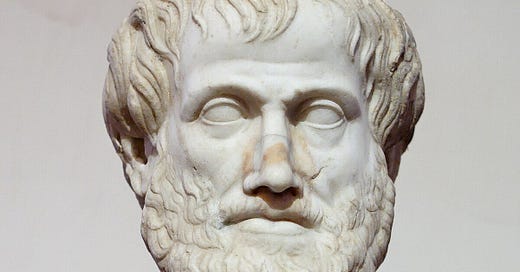Theoretical (sophia) and practical wisdom (phronesis) are both virtues connected to the rational soul, but they are connected to different functions of it.
According to Aristotle, the rational soul performs two basic functions:
The formation of scientific knowledge, knowledge concerning that part of reality the first principles of which are necessary (epistemonikon)
The formation of belief through calculation, belief concerning that part of reality the first principles of which are contingent (logistikon)
Theoretical wisdom is connected to the formation of scientific knowledge, practical wisdom to that of belief through calculation. Each is a virtue because each enables the rational soul to perform one of these characteristic functions and to do so well.
Theoretical wisdom and the formation of scientific knowledge
On Aristotle’s view, science consists in a chain of deductive syllogisms based on first principles. Correspondingly, to have theoretical wisdom is to understand these first principles and to know what follows from them.
Logic is the means by which one proceeds from first principles to the conclusions of such syllogisms which, of course, rely on them to varying degrees at certain points along the chain. But the means by which one arrives at first pricinciples are a little more mysterious, for first principles must be better known than those truths they are used to prove and, therefore, cannot be arrived at by demonstration; instead, they are grasped through but not by induction. This process has two steps:
Induction (epagoge) brings universals into the mind. Repeated perception of something leads to a set of implicitly structured memories about that thing; this is experience.
Understanding (nous) perceives the fundamental elements and first principles in the vague universals provided by experience.
Practical wisdom and the formation of belief through calculation
Deliberation is the process of by which belief is formed through calculation about matters neither falling within the domain of science of craft, and to have practical wisdom is to be good at deliberating. Because on Aristotle’s view practical wisdom only deals with the contigent and, therefore, not with the necessary, and science concerns the latter, deliberation only begins where science ends. Moreover, as Aristole characterizes the subject matter of practical wisdom as that which does not fall squarely within the domain of any specific craft, deliberation cannot concern such matters either, and skill in deliberation should be cleary distiunghed from skill in craft.
Deliberation primarily concerns means, not ends, but “means” should not be construed narrowly, as on some interpretations of Hume. Further, it is not the case that we cannot deliberate about ends; it is just that our ability to deliberate about ends is bound by our nature and the logic of our choices. Thus, we can deliberate about relative ends which are means to further ends. But we cannot deliberate about our unqualified end, happiness, for we can only deliberate about what is up to us and our nature is such that we must pursue happiness. Similarly, the logic of our choices limits can remove certain matters from the sphere of deliberation. Thus, once we have decided to pursue a well-defined activity, we cannot deliberate about pursuing its end.




